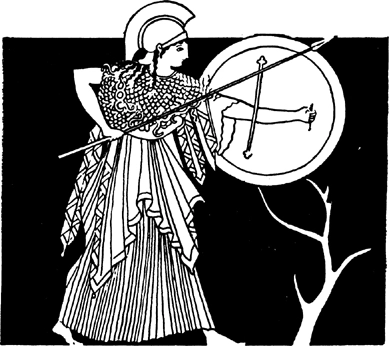These, in turn, were utterly unlike the silver, cruel and violent, concerned only with wars, and always eager to hurt one another. They disdained the fruits of the field and fed on the flesh of animals. Their stubborn will was hard as the diamond. From their enormous shoulders grew massive arms which none ventured to brave. They wore armor of bronze, dwelt in houses of bronze, and worked with brazen tools, for at that time there was no iron. But though they were mighty of build and terrible and fought one another incessantly, they were powerless against death. And when they left the clear and radiant atmosphere of earth, they descended into the murky night of the underworld.
When this race too had died out, Zeus, the son of Cronus, produced a fourth race, to live on the nourishing earth. These new men were nobler and more just than those before them. They were the heroes whom Antiquity calls “demigods.” But in the end they too fell in feuds and wars, some before the seven gates of Thebes, where they were fighting for the realm of King Oedipus, others on the field of Troy, where they had come in ships for the sake of beautiful Helen. When their existence on earth had ended in battle and disaster, Zeus assigned them a region at the very rim of the universe, on the Islands of the Blest gleaming in the dark sea. Here they lead a tranquil and happy life after death, and three times a year the rich earth grants them a harvest of honey-sweet fruits.
The old poet Hesiod, who tells the legend of the ages of man, ends with a sigh of regret: “Ah, if only I did not belong to the fifth age of men which is now come. Had I but died earlier, or come into the world later! For this is the iron age. These men are utterly corrupt. By day and by night they labor and fret, and the gods send them more and more gnawing cares. But they bring their greatest trouble upon themselves. The father does not love his son, nor the son his father. Guest hates host, and friend hates friend. Even brothers do not cherish each other with a whole heart, as in times gone by, and the grey hair of parents commands no reverence. The aged must listen to shameful language and suffer blows. O ruthless men! Have you forgotten the judgment the gods will pass, that you deny your old parents thanks for the care they had of you? Everywhere the right of might prevails, and city destroys its neighbor city. Whoever is true to his oath and is good and just finds no favor, while the evildoer and the hardhearted blasphemer are heaped with honors. Fairness and moderation are no longer esteemed. The wicked are allowed to harm the noble, to lie, and to swear false oaths. And that is why these men are so unhappy. Discordant and malicious envies pursue them and cast gloom upon their brows. The goddesses of virtue and awe, who until now have frequented the earth, sadly veil their lovely limbs in robes of white and flee from men, back to the gathering of the eternal gods. Nothing but misery is left to mortals, and no end of this mournful state is yet in sight.”

PYRRHA AND DEUCALION
IN the age of the Men of Bronze, when Zeus, the ruler of the world, heard evil things about those who dwelt in it, he decided to walk the earth in mortal shape. But wherever he went, he found that rumor had fallen far short of the truth.
One evening, as twilight deepened into night, he came to the halls of inhospitable Lycaon, king of Arcadia, who was known for his savagery. By miraculous signs and tokens Zeus made evident his divine origin, and the people knelt and worshipped him. But Lycaon scoffed at their devout prayers.
1 comment